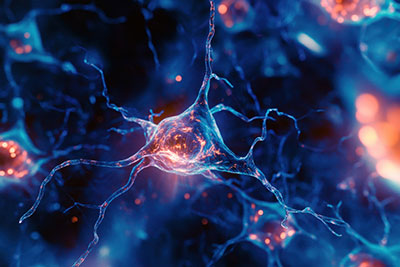Japanese researchers have linked autism with a reduced ability for the brain to remove unnecessary or weak synapse connections.
Synapses are the junctions between nerve cells. Nerve signals pass across them.
Normally, the brain undergoes synaptic pruning. This process removes unnecessary or weak connections.

A close-up illustration of a neural synapse, with electrical signals passing between the cells
But the researchers found that autistic individuals have a significantly impaired ability to clear synaptic proteins.
Their research used microglia, the primary immune cells of the central nervous system. They act as the brain’s ‘immune cells’.
The researchers used these cells to investigate neuroimmune responses.
New avenues for understanding
They say their findings could open new avenues for understanding the brain-immune system connection in autism.
Crucially, they also say this could lead to identifying potential targets for therapy.
It is thought that an overabundance of synaptic connections could disrupt normal communication pathways in the brain.
This could potentially contribute to the behavioural and cognitive features seen in autism.
Synaptic pruning takes place in early development and adolescence. Microglia, the resident immune cells in the brain, play a critical role in this process.
Acting like gardeners
In addition to defending the brain against infection or injury, the microglia act like gardeners by trimming away excess synapses to help shape healthy neural circuits.
The research adds to a growing body of evidence implicating immune dysfunction in the neurodevelopmental alterations of autism.
Previous studies have reported increased dendritic (branch-like) spine density and hyperconnectivity in the brains of autistic individuals.
But this study provides the first direct evidence of impaired synaptic pruning activity in human immune cells outside the brain.
The researchers, from Fujita Health University in Japan, published their study in the journal Molecular Psychiatry.
Related:
- Drug may stop harm of early seizures
- Launch of groundbreaking research centre
- ASD hope from cancer gene study
- Drug may stop seizures leading to autism
Published: 18 May 2025















